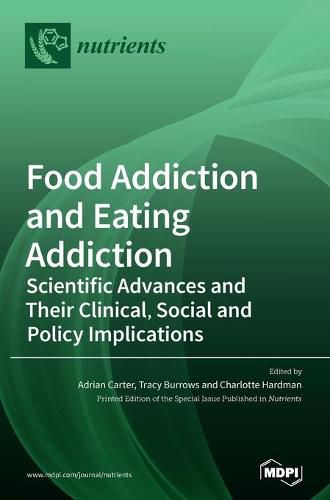Readings Newsletter
Become a Readings Member to make your shopping experience even easier.
Sign in or sign up for free!
You’re not far away from qualifying for FREE standard shipping within Australia
You’ve qualified for FREE standard shipping within Australia
The cart is loading…






This title is printed to order. This book may have been self-published. If so, we cannot guarantee the quality of the content. In the main most books will have gone through the editing process however some may not. We therefore suggest that you be aware of this before ordering this book. If in doubt check either the author or publisher’s details as we are unable to accept any returns unless they are faulty. Please contact us if you have any questions.
There is a growing view that certain foods, particularly those high in refined sugars and fats, may be addictive and that some forms of obesity may be treated as food addictions. This is supported by an expanding body of evidence from animal studies, human neuroscience, and brain imaging. Obese and overweight individuals also display patterns of eating behavior that resemble the ways in which addicted individuals consume drugs. Scientific and clinical questions remain: Is addiction a valid explanation of excess weight? Is food addiction a behavioural (i.e., eating) or substance (i.e., sugar) addiction, or a complex interaction of both? Should obesity be treated as a food addiction? Should we distinguish food addiction from other forms of disordered eating like Binge Eating Disorder? It is also unclear what impact food addiction explanations might have on the way in which we think about or treat people who are overweight: What impact will a food addiction diagnosis have on individuals’ internalised weight-bias, stigma, and self-efficacy? Should some foods be regulated like other addictive commodities (i.e., alcohol and tobacco), whose advertising and sale is restricted, or like certain foods, which are taxed? This Special Issue addresses questions raised by the concept of food addiction.
$9.00 standard shipping within Australia
FREE standard shipping within Australia for orders over $100.00
Express & International shipping calculated at checkout
This title is printed to order. This book may have been self-published. If so, we cannot guarantee the quality of the content. In the main most books will have gone through the editing process however some may not. We therefore suggest that you be aware of this before ordering this book. If in doubt check either the author or publisher’s details as we are unable to accept any returns unless they are faulty. Please contact us if you have any questions.
There is a growing view that certain foods, particularly those high in refined sugars and fats, may be addictive and that some forms of obesity may be treated as food addictions. This is supported by an expanding body of evidence from animal studies, human neuroscience, and brain imaging. Obese and overweight individuals also display patterns of eating behavior that resemble the ways in which addicted individuals consume drugs. Scientific and clinical questions remain: Is addiction a valid explanation of excess weight? Is food addiction a behavioural (i.e., eating) or substance (i.e., sugar) addiction, or a complex interaction of both? Should obesity be treated as a food addiction? Should we distinguish food addiction from other forms of disordered eating like Binge Eating Disorder? It is also unclear what impact food addiction explanations might have on the way in which we think about or treat people who are overweight: What impact will a food addiction diagnosis have on individuals’ internalised weight-bias, stigma, and self-efficacy? Should some foods be regulated like other addictive commodities (i.e., alcohol and tobacco), whose advertising and sale is restricted, or like certain foods, which are taxed? This Special Issue addresses questions raised by the concept of food addiction.